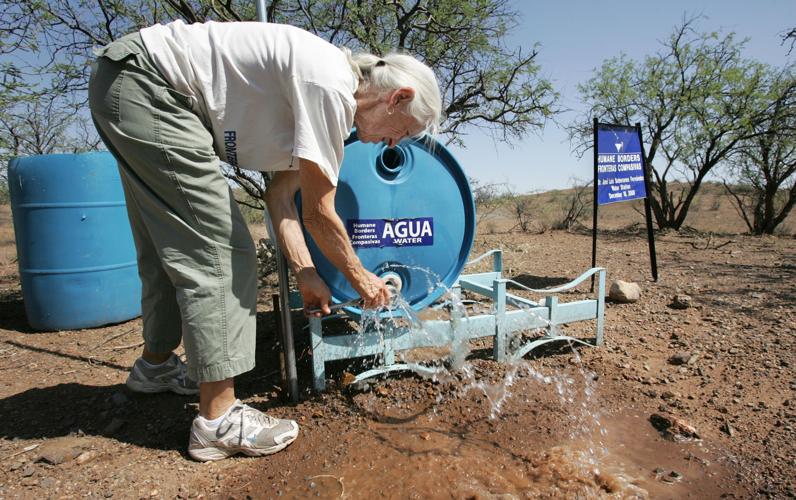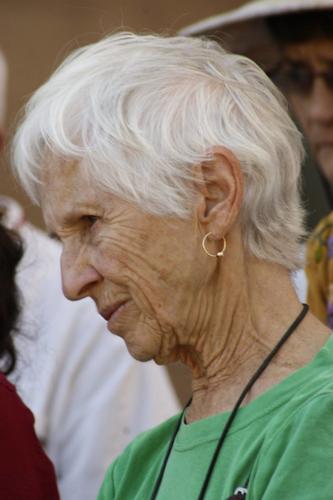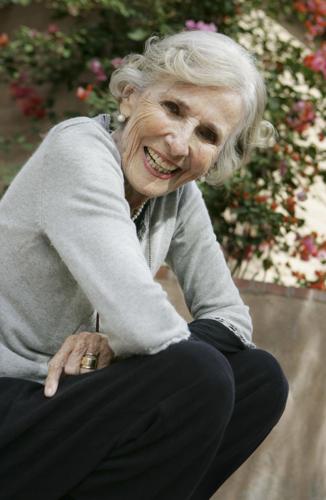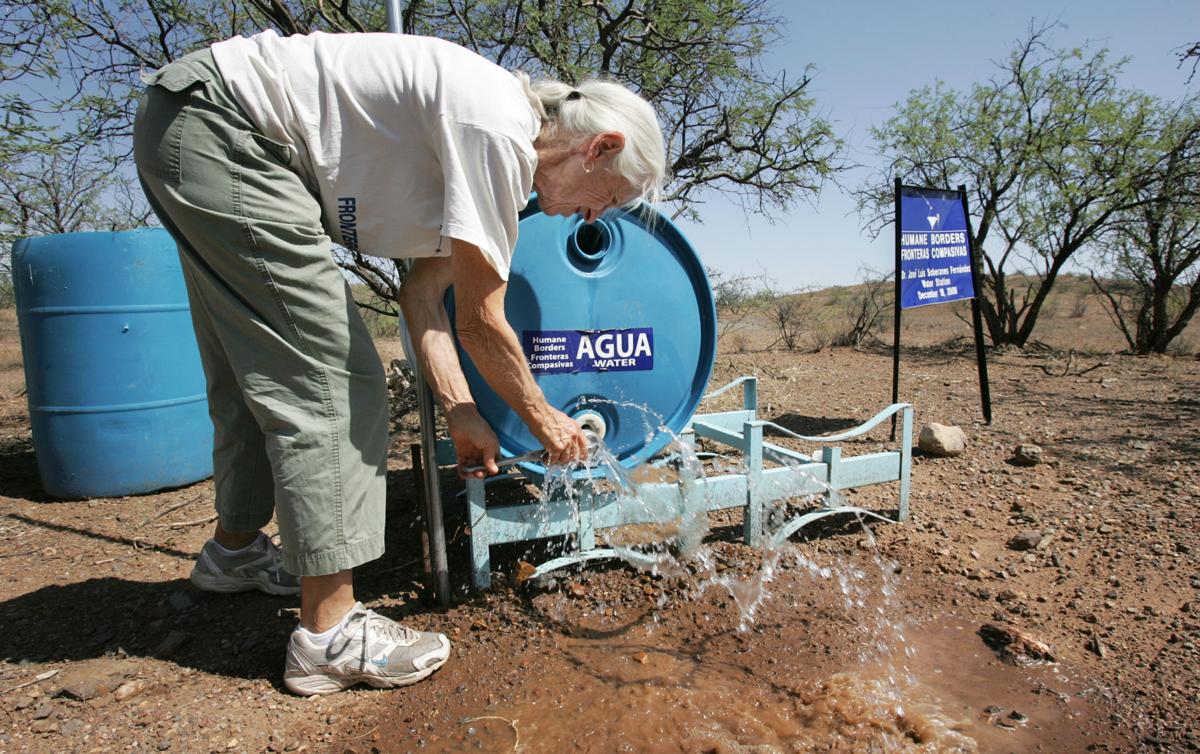As it was struggling to close, the year 2020 took my final silver-haired hero: “Lois Martin,” read the headline, “advocate for the ‘underdog’ on the border, dies in Tucson at age 86” (Arizona Daily Star, 1/2/21).
The accompanying photograph of her in a 2015 protest depicted Lois much as I recalled her from the early days of border activism: focused and serious.
I met Lois shortly after she came to Tucson, in 2005. She had already begun border support work; I had just volunteered for the humanitarian aid group No More Deaths. We were to help out at the fledgling Nogales, Sonora, aid station, passing out sandwiches and treating wounds of deported crossers who had been dumped at the border. I had no aid experience, but I did have a car, so I picked her up for the I-19 run. Lois gave instructions — pit stop near Arivaca, park on the Arizona side. Keep up. Once we arrived, she hoisted a Santa Claus-sized bag of supplies over her shoulder, and took off. I puffed along behind her, as she nimbly navigated Nogales streets. She was tiny; she was in her 70s — had over a decade on me — and I could barely keep up.

Lois Martin
Lois Martin was still delivering water to the desert to save migrants’ lives the week before she died. That was long after many of us had given up trying to keep up.
Passion for causes well beyond “retirement age” is what marks three Southern Arizona women we lost last year: Lois, Peg Bowden, and J.C. Martin. Two of them were social-justice activists; the third, doyenne of local literacy and literature.
As college professor Lois Martin came to Tucson after retiring from teaching social work in Massachusetts, so did Peg Bowden, returning to Southern Arizona after a career teaching nursing in California and Oregon.
Settling on property near the Mexican border, Peg became active with the Border Community Alliance and Green Valley Samaritans. She volunteered at “El Comedor,” a migrant aid station in Nogales, Sonora, (and offshoot of the movement that gave rise to our No More Deaths Nogales project), and wrote two books about her experiences — “A Land of Hard Edges, Serving the Front Lines of the Border” (2014) and “A Stranger at my Door, Finding my Humanity on the US/Mexico Border” (2019). Peg died in Tubac, on Dec. 27. She was 78. She’d even managed, additionally, to travel, paint, cook and play percussion in the Green Valley Concert Band.
Journalist and book editor June Johnson Caldwell (“J.C”) Martin, whom I long admired, died on Mother’s Day 2020. At 98, she wasn’t working up until the end, but she wasn’t far off.

J.C. Martin
She’d continued writing the monthly Southern Arizona Authors column for this newspaper until five years before, and, when she retired, a full phalanx of librarians was needed to take her place. Unlike Lois Martin or Peg Bowden, who relocated and somewhat retooled to pursue their retirement passions, J.C. established her base in Tucson, and expanded and broadened it to the community.
Her passion was books, and her goal was to promote them. After graduating in English and Spanish literature from the University of Arizona, marrying novelist Erskine Caldwell, and writing for a few years, J.C. began her first stint with the Arizona Daily Star in 1954. Five years later, she moved over to edit the UA’s Alumnus magazine. After J.C. published some pieces critical of the Greek system and identifying racism against Black people, her contract was not renewed, and she returned to the Star in 1970.
J.C. initiated long-lived projects and planted seeds that have helped make Tucson the literary center it has become.
As book editor, in 1977 she recruited two UA librarians and a Western historian to recommend Southwest books for a Christmas supplement. That special supplement still exists now as Pima County Library’s Southwest Books of the Year program.
A tireless promoter of local talent, in 1980, J.C. opened the previously mentioned Southern Arizona Authors column.
In 1980, she and the Star director of special services and a bookstore owner collaborated to throw a blowout book party. Irving Stone was its first headliner, and the Book & Author event brought fine writers to town for the next 16 years. Her son Jay E. Caldwell writes that this was “only indirectly the forerunner of the annual Festival of Books,” but I respectfully disagree. I think J.C.’s Book & Author event demonstrated that Tucson has a vibrant cultural/literary underpinning, and festival promoters recognized and built on J.C.’s confidence in it.
In 2007, the Pima County Public Library awarded her the Lawrence Clark Powell Lifetime Achievement Award for “distinguished contributions to Southwestern letters.”
The way I knew J.C. was as an elegant, engaging, forgiving editor. When I approached her in 1988 to do book reviews, she took my unqualified self under her wing graciously. I was an English teacher with only a few published essays to my name. I had zero journalism training. Given teaching and grading schedules, I was unconscionably lax about submissions (“Well,” she’d say, with restrained courtesy when my copy came in weeks late, “how the heck have you been?”), but she’d still run my reviews.
J.C. was an engaging talker, but she was also an active listener. She gave hints of a sophisticated life but didn’t flout it. She loved to talk books and writers, and she knew everybody. Physically beautiful — even in her 90s, with perfect facial bones, a stunning smile, elegant hair, slender figure and erect posture — she wore delicate gold and pearls, drove a pickup truck, and always had a book in her lap: now, that’s my ideal.
In addition to their undyed silver hair (Lois’ cropped utilitarian short, Peg’s, halo-like around her head, J.C.’s salon-sharp), what these women have in common was a dedication to a cause outside themselves. We look to the praise of others to memorialize them.
“She didn’t care about social justice from a distance,” Leslie Carlson said of Lois Martin. “She showed up to do the work.”
Of his mother, J.C. Martin, Jay E. Caldwell writes, “Rather than advancing her own reputation as an author, she dedicated herself to burnishing the careers of other writers. ... She was a lifelong promoter of reading, writing, books, literature, and literacy.”
But we can turn to Peg Bowden’s own words, as quoted in an obituary draft, to apply to all three: “For people of a certain age,” she wrote,” there is a notion to dial it down and limit our risks. On the contrary, I believe we should be raising hell, directing our energies toward the things we care about.”
Photos: Volunteers kick off the year with local clean up of Rillito River hosted by Tucson REI
Rillito Cleanup
Updated
Sofia Lennon, 17, walks along the Rillito Riverbed near the Oracle Road overpass looking for trash during a volunteer cleanup event organized by REI, on Jan. 4, 2020.
Rillito Cleanup
Updated
Volunteers pick up trash along the Rillito Riverbed between Oracle Road and Flowing Wells during a cleanup event organized by REI, on Jan. 4, 2020.
Rillito Cleanup
Updated
Volunteers carry a metal frame out of the Rillito Riverbed between Oracle Road and Flowing Wells during a cleanup event organized by REI, on Jan. 4, 2020.
Rillito Cleanup
Updated
Sisters Sofia Lennon, 17, and Julia Lennon, 16, pick up litter along the Rillito River during a cleanup event organized by REI, on Jan. 4, 2020.
Rillito Cleanup
Updated
Volunteers pick up trash along the Rillito Riverbed between Oracle Road and Flowing Wells during a cleanup event organized by REI, on Jan. 4, 2020.
Rillito Cleanup
Updated
Marlys Stapelbroek picks up trash with other volunteers along the Rillito Riverbed near the Oracle Road overpass during a cleanup event organized by REI, on Jan. 4, 2020.
And let us raise a glass to the lives of Lois, Peg, and J.C., and all “people of a certain age … raising hell and directing energies.”







